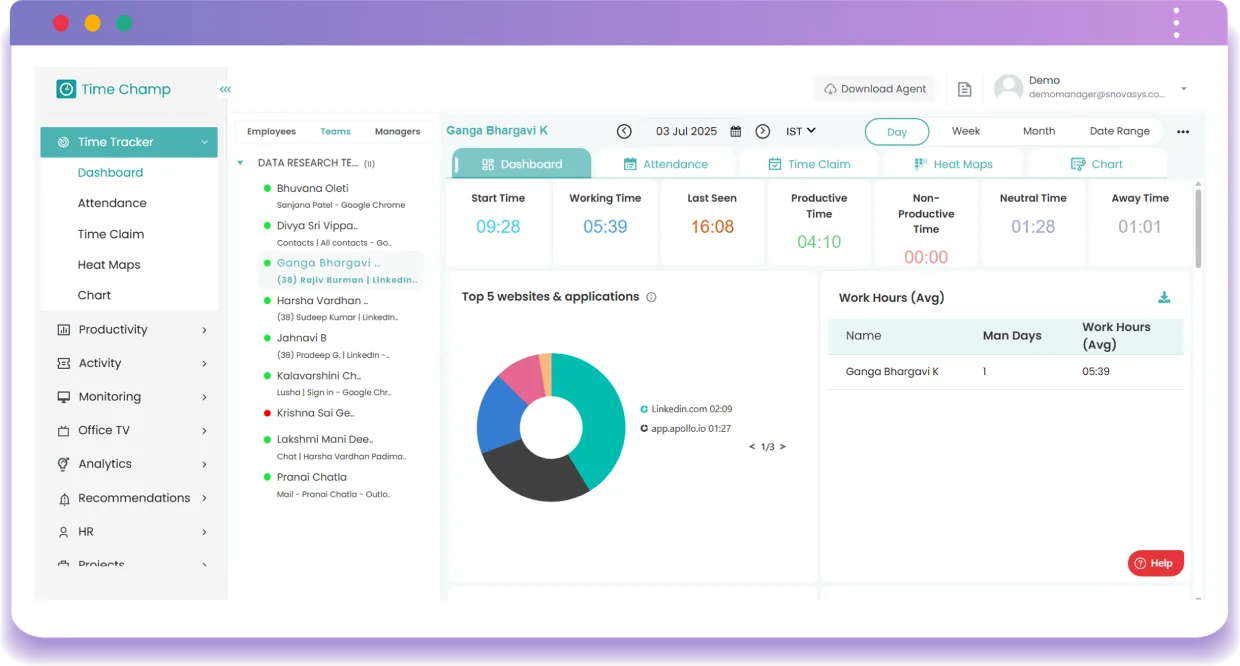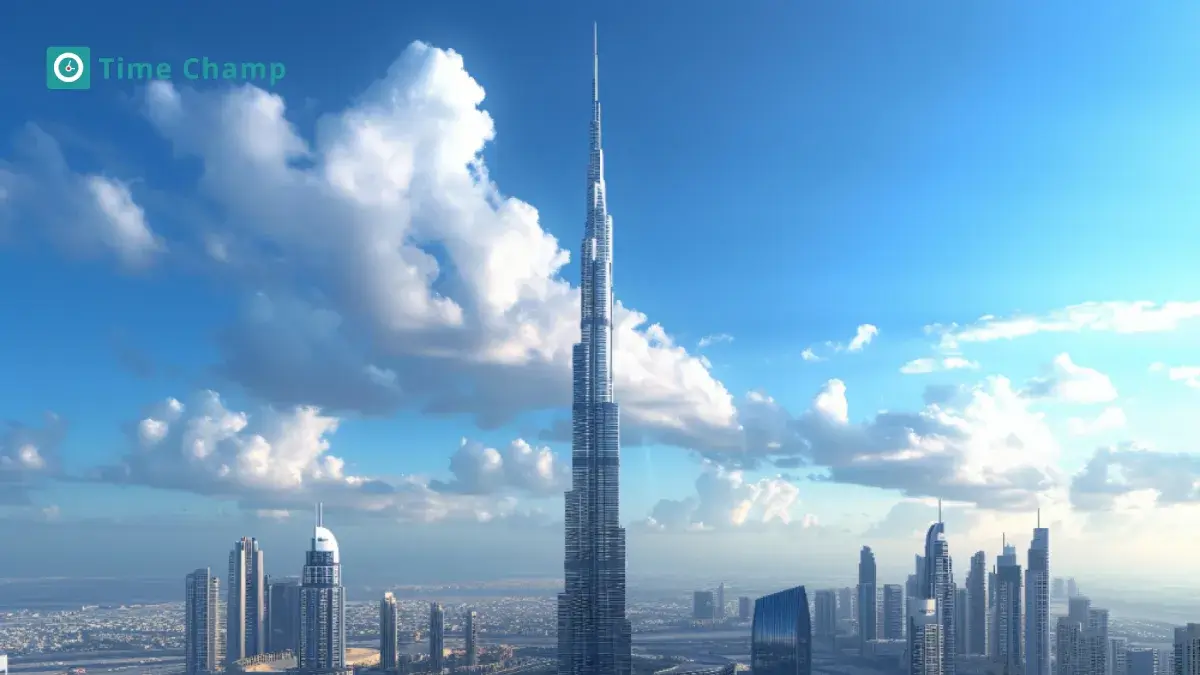The average salary in Dubai is 189,000 AED (51,463 USD) per year according to Dubai news, making it a global talent attraction city. Offering strong earning potential for professionals worldwide. However, businesses dealing with Dubai face the challenge of striking a balance between salary expectations against the high cost of the city and the diversity that professional landscapes bring. Understanding these dynamics may help organizations attract and retain more talent. This article provides valuable insights into salaries in Dubai, helping firms make informed decisions.
What is the Average Salary in Dubai?
1. Average Salary in Dubai
The average annual salary in Dubai is approximately 189,000 AED (51,463 USD), and the average monthly salary is 15,700 AED (4,275 USD). This number is just an average pulled from all sorts of jobs, everything from high-paying specialist roles to basic starting positions.
2. Median Salary in Dubai
The median salary in Dubai stands at 13,800 AED (3757.55 USD) per month. Half of all working people in the country get paid less than this amount, and the remaining half are paid more. Looking at the median income in Dubai gives a more accurate picture than the average income in Dubai, which can be affected by very high executive salaries. Since the median shows what most people actually earn, it better represents the typical worker’s earnings in the city.
3. Minimum Wage in Dubai
There is no universal minimum wage in Dubai. Negotiations between employers and employees determine salaries with the support of labor laws that guarantee fair wages. The Wage Protection System protect the workers and ensure timely and full payment to skilled and unskilled workers.
In the Gulf Cooperation Council, Saudi Arabia and Kuwait decided on a minimum wage just for some workers, like those in domestic service. It finds a balance between defending the law and supporting negotiations in the market.
Employee-wise minimum base salary in Dubai is as follows:
| Employee categories | Minimum Base Salaries (AED) | Minimum Base Salaries (USD) |
|---|---|---|
| University Graduates | 12000 | 3267.43 |
| Skilled Technicians | 7000 | 1906.00 |
| Skilled laborers | 5000 | 1361.43 |
Source: Gulf Cooperation Council
What Factors Influence Salaries in Dubai?
Salaries in Dubai have similarities in how they have been influenced by factors such as experience, education, role, and location. Such differences in job roles and industry structures help to create varying earning possibilities among different industries. Here we explore factors that influence salaries in Dubai.
1. By Experience
The salary in Dubai often depends on work experience. The more experience professionals gain in their field, the higher their earnings can be.
- 2–5 years: Average rise stands at approximately 32%.
- 5–10 years: Professionals see a 36% pay jump from the under-5-year group.
- 10–15 years: Salaries rise by 21% over professionals with under 10 years of experience.
- 15–20 years: Further increase of 14% over those with less than 15 years.
- Over 20 years: An additional 9% increase compared to professionals with less than 20 years of experience.
They clearly show how much Dubai’s job marketplaces value experience and Dubai income.
2. By Education
Academic background has a strong impact on how salaries in Dubai are shaped:
- Diploma holders: Earn about 17% more than those with only a high school education.
- Bachelor’s degree holders: Approximately 24% higher earnings than diploma holders.
- Master’s degree holders: Command salaries 29% higher than bachelor's degree holders.
- Ph.D. holders: Earn about 23% more than those with a master’s degree.
It’s no secret—more qualifications usually open the door to better-paying roles.
3. By City
Salaries in Dubai and the average salary in UAE are influenced by where professionals live, what’s booming, and how much it costs to stay. The bigger cities like Dubai and Abu Dhabi will pay a competitively much better salary than in small cities. The average salary in UAE is as follows:
| City | Average Annual Salary (AED) | Average Annual Salary (USD) |
|---|---|---|
| Abu Dhabi | 253,400 | 68997.25 |
| Ajman | 232,900 | 63415.39 |
| Al Ain | 239,000 | 65076.34 |
| Dubai | 257,700 | 70168.08 |
| Fujairah | 216,800 | 59031.59 |
| Ras Al Khaimah | 225,700 | 61454.93 |
| Sharjah | 245,300 | 66791.74 |
| Um Al Quwain | 209,700 | 57098.36 |
Source: Worldsalaries.com
4. By Profession
Wages in Dubai show clear differences between job roles.
| Job Role | Average Annual Salary (AED) | Average Annual Salary (USD) |
|---|---|---|
| Accountant | 14,000 | 3812.00 |
| Finance Manager | 45,600 | 12416.24 |
| Sales Manager | 37,400 | 10183.49 |
| Business Development Manager | 35,800 | 9747.84 |
| Chief Executive Officer | 49,500 | 13478.15 |
| Chief Finance Officer | 46,500 | 12661.30 |
| General Manager | 38,800 | 10564.69 |
| Legal Assistant | 11,200 | 3049.60 |
| Customer Service Manager | 29,700 | 8086.89 |
| Human Resource Manager | 32,400 | 8822.06 |
| Construction Manager | 35,300 | 9611.69 |
| Hospitality/Hotel Manager | 39,300 | 10700.84 |
| Tourism/Travel Agent | 13,000 | 3539.72 |
| IT Manager | 35,000 | 9530.01 |
| Graphic Designer | 12,800 | 3485.26 |
| Civil Engineer | 20,100 | 5472.95 |
| Electrical Engineer | 21,000 | 5718.00 |
| Mechanical Engineer | 21,200 | 5772.46 |
| Aerospace Engineer | 27,100 | 7378.95 |
| Architecture Engineer | 26,000 | 7079.43 |
Source: Grabjobs
5. By Gender
According to the UAE Gender Balance Council, the country has achieved major advances in gender equity, as women now hold a third of ministerial roles, make up 50% of the Federal National Council and sitting for over 57% of STEM degrees. Laws such as equal pay, paternity leave and adding women to boards have helped this movement succeed.
Gender balance perception improved from 45% in 2016 to 87% in 2022, with further growth expected. Twenty-two new laws have improved women’s opportunities in leadership, financial issues, and at work. Many international leaders appreciate the UAE as a leading model of gender equality built on collaboration and all-inclusive rules.
What Are the Highest-Paying Jobs in Dubai?
Top professionals from across the world moved to Dubai because of the city’s strong economy and tax-free income. Jobs in 2025 are highly paid because they require specialized skills and management, which are in demand in the city.
| Job Title | Average Monthly Salary (AED) | Average Monthly Salary (USD) |
|---|---|---|
| Surgeons and Medical Specialists | 60,000 – 90,000 | 16337.16 – 24505.73 |
| Chief Executive Officers (CEOs) | 60,000 – 100,000 | 16337.16 – 27228.59 |
| Lawyers (Corporate & International Law) | 45,000 – 75,000 | 12252.87 – 20421.44 |
| Investment Bankers & Finance Managers | 40,000 – 70,000 | 10891.44 – 19060.01 |
| IT Directors & Cloud Architects | 35,000 – 60,000 | 9530.01 – 16337.16 |
| Airline Pilots & Captains | 45,000 – 60,000 | 12252.87 – 16337.16 |
| Oil & Gas Engineers | 30,000 – 55,000 | 8168.58 – 14975.73 |
| Real Estate Managers & Consultants | 25,000 – 45,000 | 6807.15 – 12252.87 |
| Marketing Directors (Digital & Brand) | 25,000 – 40,000 | 6807.15 – 10891.44 |
| Senior Project Managers (Construction & Infrastructure) | 30,000 – 50,000 | 8168.58 – 13614.30 |
Source: GCCjobs
What Benefits Do Employees in Dubai Receive?
Dubai is known for its wide benefits to employees. It attracts global talent by offering a competitive work environment in the city. Employees working in Dubai get various benefits that improve their professional and personal lives. Some of the main benefits of the employees are discussed below:
1. Mandatory Benefits
- Health Insurance: All employers must offer their employees a minimum level of health insurance. This includes Dubai Health Authority (DHA) requirements in Dubai, although treating dependents is not mandatory in the insurance plans.
- Annual Leave: After one year of work, employees have the right to 30 calendar days of leave per year. Public holidays are considered in addition.
- Sick Leave: Employees are allowed sick leave of up to 90 days a year. It is broken down into 15 days on full pay, 30 days on half pay, and the rest unpaid.
- Maternity and Parental Leave: Female employees are eligible for 45 days of maternity leave (full pay if employed for over a year, half pay otherwise). Fathers receive five days of paid parental leave within six months of a child’s birth.
- Gratuity (End-of-Service Benefits): Employees receive gratuity as severance pay based on their tenure-21 days’ salary per year for the first five years and 30 days for subsequent years, capped at two years’ salary.
2. Additional Perks (Offered by Employers)
- Housing and Transport Allowances: Most employers offer compensation for expenses to cover living expenses hence expats are often entitled to a housing allowance.
- Annual Flight Tickets: A significant percentage of companies offer expatriates a yearly ticket home.
- Relocation Packages: To capture the best talents from around the world, many companies offer to reimburse the moving costs as well as visas, and temporary accommodations.
- Bonuses: Most commonly, an performance-based incentive plan is widely used, especially in industries with high competition levels such as finance and IT.
- Flexible Working Options: Currently, hybrid or remote work policies are becoming a trend to enhance the quality of the work-life balance.
3. Reforms and New Initiatives
The UAE introduced an enhanced End-of-Service Benefits System. This allows employees to invest their gratuity payments in savings and retirement plans with Sharia-compliant or risk-free choices, ensuring financial stability after service.
What Is the Cost of Living in Dubai?
The United Arab Emirates (UAE) is well known for its city of Dubai. It's popular for its luxury lifestyle, tall buildings, and lively atmosphere. People from all over the world come to enjoy what the city offers. Living expenses in Dubai might be quite high.
| Area of Expenses | Singles (USD) | Couples (AED) | Families (AED) |
|---|---|---|---|
| Accommodation | 1361.43 - 2178.29 (City Center) 816.86 - 1361.43 (Outside City) |
1906.00 - 3267.43 (City Center) 1361.43 - 2178.29 (Outside City) |
544.57 - 5445.72 (City Center) 2178.29 - 4084.29 (Outside City) |
| Food and Groceries | 217.83 - 326.74 | 408.43 - 680.71 | 680.71 - 1089.14 |
| Transportation | 81.69 (Public Transport) Higher with Car |
408.43 - 816.86 (Car Ownership) | 680.71 - 1361.43 (Car Ownership) |
| Utilities | 27.23 - 272.29 | 272.29 - 408.43 | 408.43 - 816.86 |
| Entertainment & Personal Expenses | 272.29 - 544.57 | 544.57 - 953.00 | 816.86 - 1361.43 |
Source: Godigit
Is Dubai a Good Choice for Outsourcing Your Business?
Dubai as an outsourcing destination provides businesses with a perspective on increasing the efficiency of operations and reducing costs. Here are the key factors that make it an excellent outsourcing destination.
1. Strategic Location
Being between Europe, Asia, and Africa, Dubai will give a time zone advantage allowing easy management of operations throughout the world. It is also an ideal gateway for companies reaching the Middle East and North African markets.
2. Highly Skilled Workforce
Dubai attracts diverse and multilingual workforce for companies, thus offering access to highly skilled talent in all sectors, from IT to customer support. This means that with access to top talent, there is quality service delivery at competitive rates.
3. Advanced Infrastructure
Dubai provides state-of-the-art IT infrastructure, robust telecommunication networks, and advanced facilities for an ideal business operations environment. Free zones such as Dubai Internet City augment the advantage of tech outsourcing through tax benefits and less hassle in the procedures.
4. Pro-Business Environment
Dubai is a pro-business place, with no corporate tax in many free zones, and has low tax policies in general. The regulatory environment here is compliant with international data protection and intellectual property laws, which create a business-friendly environment.
Which Industries Are Most Commonly Outsourced to Dubai?
Outsourcing activities to Dubai are highly preferred because of the city’s growing and strategically planned economy. The following sectors are taking advantage of Dubai’s outsourcing options more and more.
1. Information Technology (IT) Services
Dubai’s excellent digital technologies and qualified workers have made it a major destination for IT outsourcing. Many businesses prefer to outsource software development, cybersecurity, and cloud computing to meet the world’s demand.
2. Business Process Outsourcing (BPO)
Global Business Process Outsourcing Market was estimated to be around USD 280.64 billion in the year 2023, but it is expected to continue its growth at 9.6% CAGR from 2024 to 2030. BPO deals with outsourcing several business activities from services like customer support and data management to financial services to outside providers. Dubai’s infrastructure, quality workforce and strategic positioning establish it as a strong center for BPO operations by serving the IT and financial sectors, e-commerce ventures, and others.
3. Financial Services
Because of its strong financial industry, Dubai attracts outsourcing for accounting, auditing, and compliance. The rules set by the city and its experts allow global companies to operate their finances well.
4. Healthcare and Medical Services
Because of medical billing, telemedicine, and administrative support, Dubai Healthcare City makes the emirate a top destination for providers who want to outsource healthcare services.
5. Retail and E-commerce
Expanding businesses in Dubai’s retail and e-commerce sectors rely on outside logistics, support for customers, and marketing services to grow quickly.
6. Logistics
Technologies such as RFID, GPS, and barcoding are the main contributors to the growing importance of logistics in Dubai, which supports the UAE economy. Operational tasks are simplified with the help of CPFR (Collaborative Planning, Forecasting, and Replenishment) and VMI (Vendor Managed Inventory). Port Jebel Ali has created an important transshipment hub from Europe to Asia for Europe-Asia trade, building its logistics footprint around the globe.
What Makes Time Champ Ideal for Outsourcing?
Time Champ makes it easy to manage both in-house and outsourced teams by keeping everything transparent and organized. It helps teams work smoothly across different locations and ensures that every moment is tracked and used wisely.

1. Automated Time Tracking
Requires no manual effort to capture hours, making sure productivity is measured accurately all the time. All work done by outsourced team members is tracked with clear timestamps, making it easy to see when and what was completed. This eliminates guesswork and strengthens trust between partners.
2. Real-Time Activity Monitoring
Check the real-time work habits of your outsourced staff. Track app and web usage, view screenshots or screen recordings, and measure activity through keystroke and mouse click data. Get a clear picture of focus and output in real time.
3. Time zone Flexibility
Schedule and progress updates are automatically shown in each team member’s local time, keeping everyone on the same page. Managers are able to smoothly run operations in different parts of the world. Everyone stays aligned, regardless of where they’re located.
4. Project Management Made Simple
Organize, assign, and monitor every project with ease. Create tasks, set deadlines, and track progress, all from a central dashboard. Get full visibility into who’s doing what and when, ensuring smooth coordination and timely delivery across your outsourced teams.
5. Customizable Workflows
Adapts to your needs with personalized settings, user roles, and flexible work approval options. Whether you’re working with freelancers or partner agencies, Time Champ fits smoothly into your workflow.
Conclusion
Dubai offers competitive salaries across the globe because of the city's reputation as a global economic center. Salaries vary by profession, education level, and years of experience. But, due to tax-free income and good support, Dubai is attractive to experts from all over the world who want to work there. The city’s strong talent pool and strategic location make it a popular choice for businesses to outsource their work. Dubai will continue to grow and become one of the great destinations for professional advancement and investment opportunities that can balance financial prospects with a great standard of living.
Frequently Asked Questions
Earning between AED 18,000 and AED 30,000 (about USD 4,900 to USD 8,168) is usually considered a good income in Dubai. This range allows for a comfortable lifestyle, covering expenses such as rent, transportation, food, and leisure activities.
Yes, it’s possible to live in Dubai for $4,000 per month (AED 14,700) is feasible, especially for individuals. This income can cover essential expenses such as shared accommodation, public transportation, groceries, and basic leisure activities. On the other hand, you will likely need to control your budget tightly if you plan to live in a private space or have dependents.
Around AED 183,500 a year (about AED 15,300 per month) is about the average Dubai income and offers a decent, single person’s lifestyle. A monthly salary of AED 50,000 ($13,600) for a family or someone seeking luxury living really improves quality of life.








